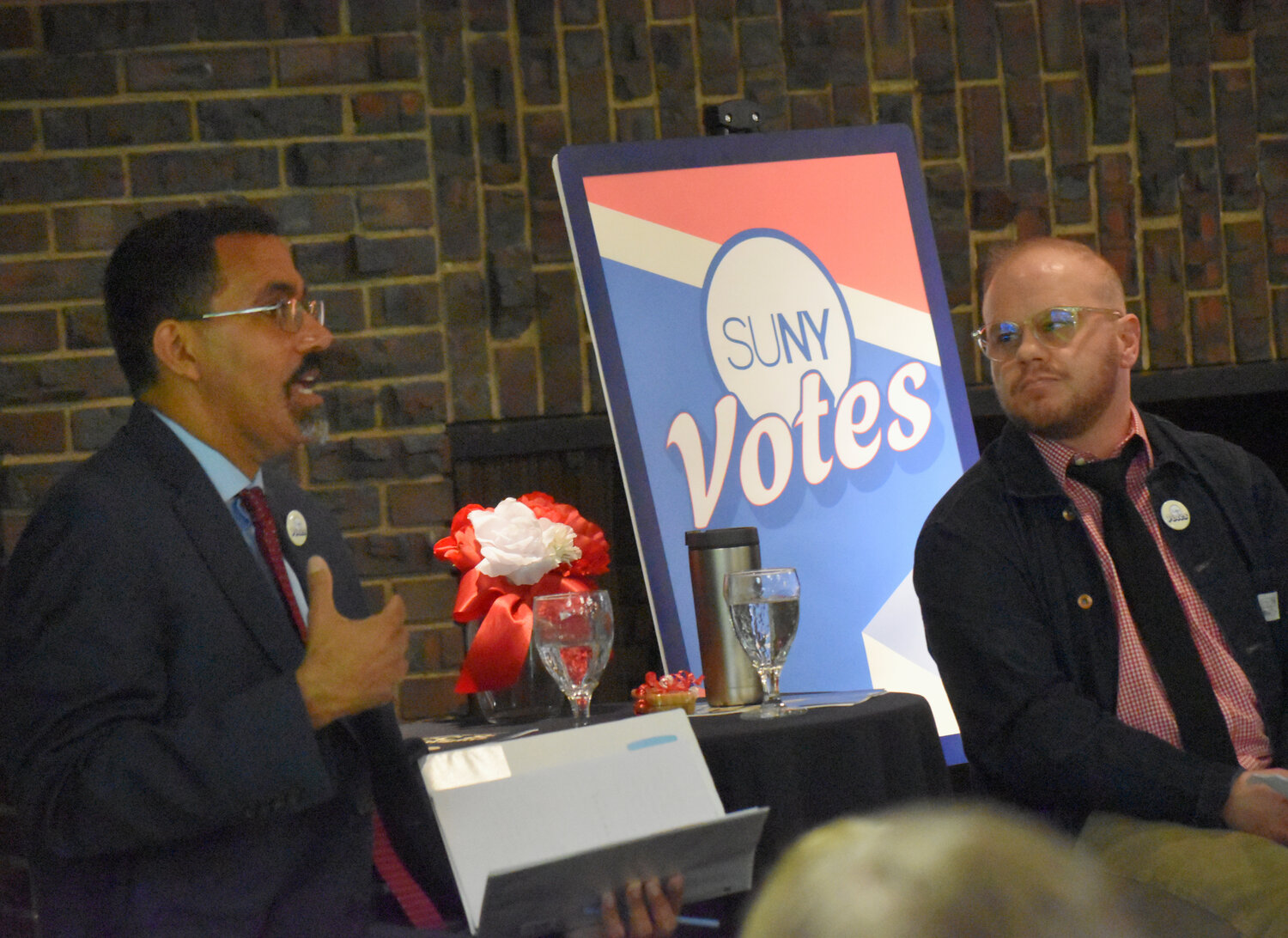
Celeste Perkins is just the kind of SUNY Cortland student who Chancellor John B. King wants to see on campus: She plans to vote.
Perkins, a junior conservation biology major from Cortland, was strolling down Prospect Terrace minutes after King had led a panel discussion followed by a news conference on steps the State University of New York is taking across the state to encourage students to vote. Perkins is already registered.
“I like the idea of my voice being heard,” Perkins said, although she’s never voted before. She plans to show up at a polling station the college will maintain on campus on Nov. 5.
“They not only go to class in pajamas, they go to vote in pajamas,” SUNY Cortland President Eric Bitterbaum said at the news conference with King. He confesses that he wore a jacket and tie to vote for the first time as a college freshman.
King’s appearance in Cortland was to mark Constitution Day, which coincides with National Voter Registration Day. He led a panel discussion of politics scholars in the college’s Corey Union, discussing both what it takes to get a college student to the polls, and the increasing efforts that make voting by students, and other American sub-groups, more difficult.
“For us civic engagement nerds, it’s like Christmas,” King said. “Voting is a habit, like anything else,” said Joseph Anthony, an assistant professor of political science at SUNY Cortland, and efforts to get young people to the polls need to focus on that. Elections are the difference between democracy and dictatorship. But election only work if we use them.”
But a number of efforts that proponents say will protect election integrity will actually undercut voter participation, the experts said. “A lot of the talk about voter fraud is intended to discourage the voter. It’s intended to get you to check out,” said Emilye Crosby, a history professor at SUNY Geneseo. Anthony added that reports show only 31 instances of significant voter fraud between 2000 and 2016, and the nation’s 10,000 or more elections officials squelch it in a decentralized system that makes large-scale fraud virtually impossible.
Efforts to reduce fraud, such as requiring government-issued photo ID to vote, mean students and black people are less likely to be able to vote. Crosby said 11% of voting-age Americans lack a government-issued ID, but nearly 25% of black people don’t have one.
“It fixes a problem that doesn’t exist, but it causes the problem we have — voter apathy,” Crosby said.
Bekeh Ukelina, a history professor at SUNY Cortland, knows first-hand what voter apathy, and voter suppression can me. He grew up in Nigeria during a military dictatorship. America isn’t that bad, he said. Yet.
“Americans should be very, very worried,” Ukelina said, and suggested a couple of steps to make voting easier, for students and everyone else.
“Why can’t we have elections on the weekend?” he asked. “Why can’t we have a lecture-free day so they can vote?”
In a similar vein, Crosby outlined a bill in Congress that would make Election Day a federal holiday.
The college, and the rest of the SUNY system, is doing what it can, Bitterbaum and King said. King announced that 23 campuses will receive mini-grants, about $3,000, from the Ibis Group to improve student voter turnout, from staffing information tables to buying stamps and supplies to vote by absentee ballot.
Sixteen campuses, including Cortland, will have polling stations on campus, King said.
“Our faculty and staff have been encouraging students to register to vote right on the campus,” Bitterbaum added.
Current statistics were not available, but in 2014, only 6.3% of SUNY Cortland students voted. But the college began a concerted effort to get students registered, and then to the polls. By 2018, 77% were registered and 24% voted. In 2020, 85% were registered and 69% voted.
That advances a theory that Crosby puts to her students in Geneseo, based on her childhood in Mississippi, where more black people were elected to office in 1975 than were registered to vote just 10 years earlier: “If they think they matter, they might.”
Editor's note: This story was updated to correct that Emilye Crosby grew up in Mississippi.